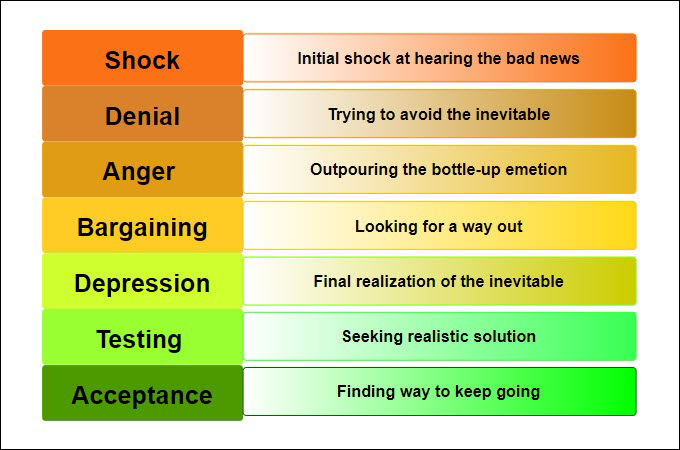(Thread IKs:
Stereotype)
|
silicone thrills posted:It's kind of interesting to relate this stuff into my real every day life. I and my sister have a very severe cancer gene in which our doctors are advising us to go ahead and have a fully ovary and fallopian tube removal before we hit age 45 because - we will loving die from a horrible flavor of ovarian cancer and by the time you know you have it, its basically always too late - and I dont really shy away from this information. My geneticist asked if I wanted more or less information because she knows that there's people who only want the "need to know" sort of poo poo but i'm the type of person who will dive in and loves to know everything. I have about a 10% chance of getting this horrible flavor of cancer and I want to do everything I can to prevent it. What people think "doomers" believe in this context would be "gently caress it, you're going to die someday anyway so why bother learning about your genetic cancer risk or really even going to the doctor at all" It's just lazy trolling
|
|
|
|

|
| # ? Jun 7, 2024 10:58 |
|
ah hah you see I want to live as long as possible.
|
|
|
|
i really think the dramatic escalations in the environment lately are starting to crack some pings but we are still only getting the left of center liberals that take comfort in pretending they are serious by actually learning about the subject i'll believe we've made progress when the guy driving a 12 foot tall coal factory to Applebees is having an existential crisis because they no longer sell fish nationwide or something
|
|
|
|
croup isn't a "left of center liberal"
|
|
|
|
Rectal Death Adept posted:i really think the dramatic escalations in the environment lately are starting to crack some pings but we are still only getting the left of center liberals that take comfort in pretending they are serious by actually learning about the subject A climate optimist is just a denialist who could no longer deny because it's so blindingly obvious. I know people will deny they're sick with something even as it kills them but even the coal rollin' boys have a limit sometimes
|
|
|
|
Zodium posted:croup isn't a "left of center liberal" Looking at anyone elses posting history is a mistake. If you look into the abyss, it will stare back.
|
|
|
|
ironically i can't understand the reason someone would go into a thread and ask the people posting there "why are you posting about this?" do people do that in the war thread? or the one that talks about trump? why would anyone talk about the economy? there is no difference between any of those topics and this one except that those don't matter
|
|
|
|
croup is good people and attacking anyone who doesn't immediately absorb the thread consensus as a liberal hoper shill sucks rear end
|
|
|
|
Stereotype posted:ironically i can't understand the reason someone would go into a thread and ask the people posting there "why are you posting about this?" do people do that in the war thread? or the one that talks about trump? why would anyone talk about the economy? there is no difference between any of those topics and this one except that those don't matter this and the Covid thread make people uncomfortable and they have this insatiable desire to do some pretty bad posting about it
|
|
|
|
Zodium posted:croup is good people and attacking anyone who doesn't immediately absorb the thread consensus as a liberal hoper shill sucks rear end yeah but he didn't quote my response and instead posted like elon musk so maybe you're the wrong one here
|
|
|
|
Zodium posted:croup is good people and attacking anyone who doesn't immediately absorb the thread consensus as a liberal hoper shill sucks rear end idk maybe anyone talking about a thread consensus is actually a bad poster
|
|
|
|
also for the record my view is that we can do something to repair the damage done to the biosphere and stave of civilizational collapse and possibly even the complete sterilization of the earth, we just aren't going to
|
|
|
|
Stereotype posted:also for the record my view is that we can do something to repair the damage done to the biosphere and stave of civilizational collapse and possibly even the complete sterilization of the earth, we just aren't going to We have to know how bad it is for this to ever be possible but I guess it's a "bad thread consensus" to even agree that knowledge is a good thing
|
|
|
|
4d3d3d posted:We have to know how bad it is for this to ever be possible but I guess it's a "bad thread consensus" to even agree that knowledge is a good thing the pretty ubiquitous opinion i have heard when i morosely describe my understanding of how immediately dire the situation is on pretty much every ecological front is that if people more generally knew that it was that bad then they would become fatalistic and not effectively work to fix things. which is worse than now when they don't understand the situation and also aren't effectively working to fix things.
|
|
|
|
Stereotype posted:yeah but he didn't quote my response and instead posted like elon musk so maybe you're the wrong one here you posted a bunch of patronizing verbiage about how this is the most depressing and fatalistic place on the internet to his question about why we spend time on biosphere collapse and then tried to flip the question around.
|
|
|
|
croup coughfield posted:im trying to understand the position of the posters in this thread Sentient petroleum products contemplating the morality of petroleum production
|
|
|
|
Stereotype posted:also for the record my view is that we can do something to repair the damage done to the biosphere and stave of civilizational collapse and possibly even the complete sterilization of the earth, we just aren't going to this is also like saying my 17 year old dog could be trained not to go crazy over food and not to bark at the Amazon guy, but itís not happening we are subjects of a system that created everyoneís thought patterns and perception. we are all proletariatized by the system; we have given over the knowledge and decision making to the system. even the rich have undergone cerebral desertification. the system controls the masses, or the mass-object, and it makes those decisions cyberneticslly. which is all of us even if individual particles donít conform. Ty hats why itís wrong to say ďwe wonítĒ, the system wonít now the system has fundamental contradictions that are increasingly fracturing, eventually it will crack. that day is also coming closer every year, but itís not now, and itís not tomorrow. local conditions can be improved, slightly, but changing the inertia of the system is impossible until it fractures and the masses wield the broken shards as blunt weapons to the rest of it itís just thereís one fun twist; thereís a ticking clock. thatís why itís interesting bc itís fascinating study to see which clock winds down first
|
|
|
|
Stereotype posted:any other ones besides these I should add? I can do it tonight when I’m at my computer das Kapital and overshoot are the most important two books, although DK needs to be supplemented by recent ecomarx scholars too. Jason Moore and Bellamy Foster and whatnot.
|
|
|
|
Stereotype posted:the pretty ubiquitous opinion i have heard when i morosely describe my understanding of how immediately dire the situation is on pretty much every ecological front is that if people more generally knew that it was that bad then they would become fatalistic and not effectively work to fix things. which is worse than now when they don't understand the situation and also aren't effectively working to fix things. There's no evidence to support this, and evidence against it https://www.sciencedirect.com/science/article/abs/pii/S0959378016300450 "Emotional distress is strongly correlated with mitigation motivation; hope is not." Sorry I'm being a knowledge fascist though
|
|
|
|
Xaris posted:I disagree. we donít have magical holodeck technology. Mary Catherine Bateson posted:As a child, I had the early conversations of the cybernetic revolution going on around me. I can look at examples and realize that when one of my parents was trying to teach me something, it was directly connected with what they were doing and thinking about in the context of cybernetics.
|
|
|
|
Xaris posted:we are subjects of a system that created everyoneís thought patterns and perception. we are all proletariatized by the system; we have given over the knowledge and decision making to the system. even the rich have undergone cerebral desertification. the system controls the masses, or the mass-object, and it makes those decisions cyberneticslly. which is all of us even if individual particles donít conform. Ty hats why itís wrong to say ďwe wonítĒ, the system wonít what does cybernetically mean in the context of this excerpt? itís not how I would phrase it, but it does jibe with my understanding of populations and their environments as systems and not as separate entities made of things like ďpoliticiansĒ and ďresourcesĒ Mr. Sharps has issued a correction as of 23:47 on Apr 26, 2023 |
|
|
|
Zodium posted:you posted a bunch of patronizing verbiage about how this is the most depressing and fatalistic place on the internet to his question about why we spend time on biosphere collapse and then tried to flip the question around. not only did i provide an honest personal answer to their question, but the question deserves to be flipped around. "what reward you derive from the behavior, emotionally" is an incredibly patronizing question that's goal is not to gain knowledge or understanding, but instead is meant to insinuate judgement from a falsely self-elevated position of superiority. you could ask the same question of someone who follows sports or plays settlers of catan or watches The Bachelor and the answer would be the same varied assortment of answers that anyone uses to prescribe meaning to actions. We don't have to justify why we are paying attention to and talking about something that inarguably effects us and have an acceptable answer so that a voyeur can "draw further conclusions."
|
|
|
|
planet??
|
|
|
|
Epitope posted:Sentient petroleum products contemplating the morality of petroleum production Pretty much the plot of Phantoms, which I hear Ben Affleck was "the bomb, yo" in by a quasi-reliable somewhat fictitious source. >.>
|
|
|
|
Also once you learn about things you canít unlearn them. If you are familiar with the dynamics of climate change, having access to a group of people who also understand will make it easier to process the information that comes in through normal media without feeling like you are insane. If you see an article about a carbon capture plant that can remove the equivalent of a thousand cars and itís being treated like the solution to all the problems, and you actually know something about the magnitude of whatís going on, youíre gonna feel like the world is gaslighting you. So some community is nice. I think similar dynamics exist for many of the threads in cspam, certainly for plaguethread at least.
|
|
|
|
Stereotype posted:not only did i provide an honest personal answer to their question, but the question deserves to be flipped around. "what reward you derive from the behavior, emotionally" is an incredibly patronizing question that's goal is not to gain knowledge or understanding, but instead is meant to insinuate judgement from a falsely self-elevated position of superiority. you could ask the same question of someone who follows sports or plays settlers of catan or watches The Bachelor and the answer would be the same varied assortment of answers that anyone uses to prescribe meaning to actions. We don't have to justify why we are paying attention to and talking about something that inarguably effects us and have an acceptable answer so that a voyeur can "draw further conclusions." i have no problem critically examining why I engage with an emotionally difficult topic like biosphere collapse if someone wants to ask. that's a valid question i've thought a lot about and think I have a good answer to. go back and read your reply. which part is supposed to be an honest personal answer to the question? is it the part where you speculate that the primary motivation, which varies from poster to poster, seems to be that it seems wrong to look away, or grim curiosity, or the part where you speculate that they take comfort in being aware and informed? is it the part where you conjecture that we're all quite convinced that there is little or nothing that we can do to stop the exponential fall of the basic ecology of the planet itself, which you apparently don't actually believe but simply that we won't? there's nothing personal in your whole post. you keep it at arms' length all the way until you flip the question around without ever answering it.
|
|
|
|
4d3d3d posted:A climate optimist is just a denialist who could no longer deny because it's so blindingly obvious. I know people will deny they're sick with something even as it kills them but even the coal rollin' boys have a limit sometimes Climate optimists have passed the denial stage of climate change, they're stuck on the fourth stage; bargaining 
|
|
|
|
test deez nuts
|
|
|
|
Why do I like these threads? Science, philosophy, lively discussion, environmentalism. But really, I think what draws me back a lot is seeing the people completely incapacitated by grief, and having the sight of them stir some spirit of Bluto Blutarsky to come rally to cheer me up
|
|
|
|
Brendan Rodgers posted:Climate optimists have passed the denial stage of climate change, they're stuck on the fourth stage; bargaining 
|
|
|
|
Zodium posted:croup is good people They're either a troll or shockingly stupid. What are you getting, emotionally, from defending them?
|
|
|
|
croup coughfield posted:i do have a serious question for the doomers while im here though: what are you getting out of spending so much time and energy focused on catastrophe? like what purpose is this serving for you? The "purpose" of communication is social signaling as to one's status in and relation to the group Ideas are used as means to construct a feeling of security within an insecure world Hooting at the disaster ensures that other apes will see the disaster and hoot and point with you, and it feels good to hoot and point as a group Hoot Point
|
|
|
|
|
|
|
silicone thrills posted:lol the dumbest motherfuckers on earth are the most powerful people on earth and I can't believe there's dipshit cope/hope liberals telling us that everything will be fine.
|
|
|
|
|
I'm the bottle-up emetion
|
|
|
|
we can sell this emetion in bottles
|
|
|
|
OVERSHOOT LOOP: Evolution Under The Maximum Power Principle
|
|
|
|
Fell Mood posted:They're either a troll or shockingly stupid. they have brain damage. There's no other explanation
|
|
|
|
Fell Mood posted:They're either a troll or shockingly stupid. he's a troll, but he's also smart and knowledgeable. it would be good if he participated in the thread.
|
|
|
|

|
| # ? Jun 7, 2024 10:58 |
|
Zodium posted:he's a troll, but he's also smart and knowledgeable. it would be good if he participated in the thread.
|
|
|





























